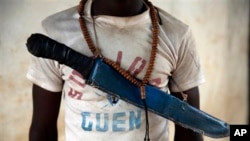Violence in Central African Republic has taken a heavy toll on food security. A new U.N. assessment says crops, livestock and fishing have all been affected.
Nearly one million people have been displaced in the CAR conflict and thousands have been killed. Seleka rebels and anti-balaka militias battle each other, as well as attack civilians. Many who usually grow crops have been unable or too afraid to do so.
The World Food Program and the Food and Agriculture Organization conducted the assessment of how violence has affected food supplies.
WFP’s Frances Kennedy said, “From a crop point of view we know that the insecurity in the Central Africa Republic has had a significant effect. Much less land has been used for cropping. And the production is down something around 58-percent from the average years prior to the crisis that erupted into conflict in the Central African Republic.”
The number of livestock in the country has plummeted.
“This is largely because of cattle rustling, raids, insecurity and violence. So we’ve seen the livestock numbers down by as much as 77-percent. Some of that raiding has even been across the borders from other countries. For these people, who are herders, that’s everything. That’s their livelihood. That’s how they live and survive,” she said.
The supply of fish has fallen by about 40-percent.
Kennedy said, “Even in fisheries on the big rivers in the Central African Republic – that too has suffered because many of the fishing boats and the nets were destroyed. And some areas are not safe enough for people to go fishing.”
To offset damage done to the food sector, the Food and Agriculture Organization has been supporting nearly 118,000 households. It’s provided seeds and farming tools. The World Food Program is providing rations to ensure people don’t eat the seeds meant for planting.
“So that has, if you want, staved-off and prevented the situation from being even more serious than it is. But much more support and investment [are] needed there, both for the agriculture sector and also ongoing food support,” she said.
The U.N. assessment found that “food reserves in rural areas are now around 40 to 50 percent lower than average levels.” Family income levels are down sharply. Many have resorted to other means to raise money, like selling wood or charcoal.
“The assessment has found quite clearly that families are skipping meals and reducing portions. So, it’s not so much the actual prices of the food in the market – though that has been affected – but it’s people’s capacity to be able to buy the food that they need for their families,” said Kennedy.
In the capital Bangui, prices of staple foods are reported to have risen 30 to 70 percent from March to August. What’s more, surveys of displaced people -- and those in isolated communities – indicate many “are at high risk of malnutrition.”
She said, “We do need to keep reminding the international community and donor governments that the people here are still in very poor shape. And action is necessary now to make sure that things don’t degenerate further.”
Aid appeals for CAR total around $260-million this year, but less than half of that has been received.











